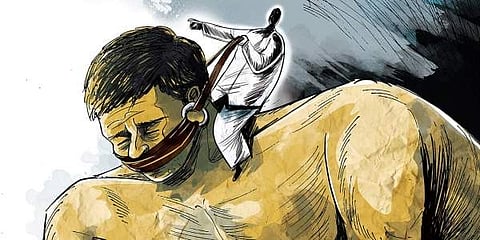

It was 1995 when I, a Class 6 boy, was first exposed to caste violence in Alangulam. The town in Tenkasi was then part of the Tirunelveli district. A personal dispute between two persons triggered caste violence in several villages. My dad and the father of one of my classmates rushed to our govt-aided school in Nallur on bicycles to take us back home.
When we were crossing Alangulam, we saw two buses engulfed in fire. Police diverted us through an alternative route. Three other buses were set on fire by a mob after we crossed Alangulam. An adult and a child were killed in police firing. Male residents of villages took refuge in sorghum fields. The straw stocks gave them cover from the police’s preying eyes. ‘Oorkattuppaadu’ (self-imposed restriction) was implemented in our villages.
All entries were blocked with branches of Seemaikaruvelam trees. Overhead tanks were used as a watchtower to check on people entering villages. Some elders prevented youngsters, who were attempting to set ablaze a government bus heading to Ambasamudram, by snatching kerosene cans from them. Some outsiders were also called in by inimical elements to teach the technique of making country bombs. Many lives were lost due to riots over the years. The situation was the same across southern districts in 1990s.
Successive governments started cracking down on caste violence. Panels were formed to study caste-related issues and remedial action pointed fingers at unemployment and casteist attitudes of government staff, particularly those in the police. They also recommended improving basic amenities in schools. But tasks that should have been completed in the last 20-plus years in schools still remain unfulfilled.
Apart from casteist parents, government and aided schools have now turned breeding grounds for casteist youngsters. Most of the student clashes originate in these schools. Several casteist teachers are biased against students of other castes. Things are not better in private schools. But school management there doesn’t allow teachers to overtly demonstrate their caste prejudice as it would affect admissions.
A government school student near Ambasamudram was stoned to death by a fellow student last year over a ‘caste-wristband’ dispute. Both the Nanguneri victims and the suspects who attacked them are students of a government-aided school in Valliyoor. Most of the children charged with posting casteist remarks on social media are students of government or aided schools. In 2017, the government formed school-level committees headed by physical education teachers to monitor caste issues. But they are not functioning now.
A few months ago, a BC government teacher in Thoothukudi district sought help from an MBC student to defeat an SC candidate in a parent-teacher association election. When the MBC student asserted that everyone is equal, she made strong casteist remarks. She was suspended after the phone conversation went viral. Two years ago, some teachers petitioned the Tenkasi collector and CEO, seeking action against a block education officer. One of the accusations was that the BEO was speaking about the pride of his MBC caste in classrooms during school inspections. An inquiry was conducted by Sankarankovil DEO. It was said irregularities such as bribery were treated seriously but the ‘caste pride’ accusation was not taken seriously.
An MBC headmistress in Tenkasi was accused of using derogatory language against parents of SC students. She was also accused of showing partiality in arranging chairs for SC students. No teacher or parent came forward to file a formal complaint against her. Apart from conducting awareness programmes, explanations must be sought from teachers whenever children are involved in caste fights or caste-related activities on social media.
When the reporters asked about the violent behaviour of students last year, the School Education Minister Anbil Magesh said it was the job of teachers to correct their behaviour. He further went on to say that the teachers are like second mothers to the students. I completely agree with the minister. Teachers should remove the casteist feeling from the minds of the students during their primary education itself. There is no point in worrying about students’ behaviour during their higher education.
ALSO READ | Melpathi row will be settled soon, says RDO
(Footnote is a weekly column that discusses issues relating to Tamil Nadu)